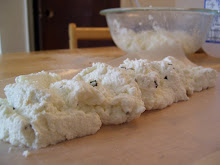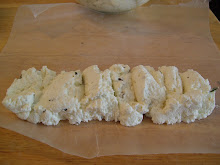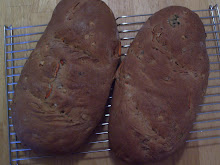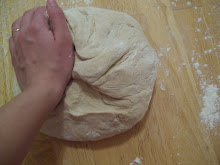Lately my food experiments have taken on a new level – vanilla extract, ginger beer, sourdough, cheese. All of these foods, much like foods raised from seed or from birth, require a certain amount of time. How wonderful that food, especially such good and tasty food, simply requires time. Time to grow, develop, and steep in flavor. But is that true, do they require time? In a sense, yes. Time is required for the item to reach its full and proper taste. But there is another way to look at it. These food items allow time. These sorts of simple foods are quite different from the preparation of a meal using these foods as ingredients. Indeed a meal requires a different interaction with time. Things usually happen in periods between a few minutes and possibly up to an hour. Things need to be flipped, stirred, and added at particular times. Also, the meal must be served at an appropriate moment – when the food is done, and not too hot and not too cool. But more basic, simple foods are not quite so demanding. They perhaps need to be stirred, kneaded, watered, etc after a number of hours, days, or weeks. The service and delightful eating of these foods is also not so immediate – perhaps in the next few days or even longer. These foods create, within the very nature of their processes, a space of time that is unoccupied.
Food is a tricky thing. The nature of our human relationship to food is quite base you could say – a matter of pure necessity and survival. It ties us three times a day to our mortality. Plato and Aristotle viewed food preparation and cultivation as labors most appropriate to slaves. Because food is a labor tied to the labors of survival, it requires too much time and pressure for a philosopher. It would impede the leisure time that is needed to ponder “higher” matters.
But I must wonder, is it possible to contemplate higher ideals without being in some way tied to your own mortality? The labors of survival are what tie us inextricably to the stories and cycles of life and death. Does not our view and keen awareness of death present a mold which shapes and solidifies our approach to life? Being aware that our time on earth is limited creates a certain meaning to our actions of humans. In a simple sense: existing in time matters. Being aware of that fact also matters. But there is the rub. How to become aware of existing? And how to maintain that awareness? I feel this sort of awareness is quite present in the contemplative practices of many religions – the importance of prayer, meditation, intention, awareness, contemplation. This vigilance can be further nurtured by participating in and being witness to the cycles of mortality and life. Growing, harvesting, and preparing food can be an ever-present reminder of our mortality. It provides a valuable perspective on the bounties of the earth, where we as humans fit into the world, and an experience-derived understanding that we indeed (as summarized from a few Bible passages) cannot live by bread alone. By understanding and participating in our bodily sustenance, we become aware of the nourishment of the soul. The process of cultivating food is rife with metaphors for the spiritual life. In the New Testament, Jesus often utilizes these metaphors in his parables. Others in the religious life have published books about how certain food practices connect them to and deepen their spiritual life. I personally have found that after working with my hands, my mind becomes sharper and I settle into a peaceful rhythm. In this state I find the seed of my contemplative life. At all times, even when no one is speaking, when I use my hands I am listening intently.
So why did I begin by discussing foods that require and allow time in their making? Because it is those unoccupied moments that are so rich and full of possibility. The work of the hands prepares the food, but also prepares the mind for a moment of rest that is alert and stimulated. The time between tending food provides time for contemplation. But it does much more than provide the time. In fact the body, mind, and soul are at a prime moment for contemplation: the body ready for rest, the mind alert and aware, the soul hungry for a moment of tending.












2 comments:
As I read your posts, I have the Shaker motto "Hands to work, hearts to God" and the hymn "Simple Gifts" in mind. Beautiful work.
Wonderful words. I pray they continue.
Post a Comment